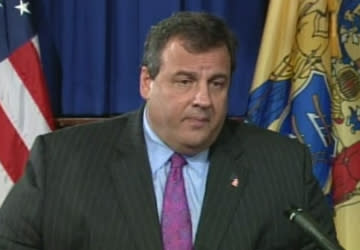 The Ticket
The TicketChris Christie declines (again) to run for president

Chris Christie ended his brief flirtation with a 2012 presidential run Tuesday, insisting, as he has previously, that a White House bid "just didn't feel right."
"In the end, what I always thought was the right decision remains the right decision today: Now is not my time," Christie said in an afternoon press conference in New Jersey.
The governor was firm that his opposition to a 2012 bid had never changed, but admitted he had recently "paused to really reflect" on his decision after being pressed to reconsider the race.
"I felt an obligation to seriously consider what people were asking me to do," Christie said. "For me, the answer was never anything but no ... It never felt right to me."
Christie's announcement is sure to disappoint some major Republican donors and activists, who had been pressing the New Jersey governor to reconsider running for the 2012 nomination amid questions about Rick Perry's viability in the race and a lack of passion for Mitt Romney's candidacy.
What does Christie's decision mean for the remaining candidates? Romney seems to be the clear winner. His support among moderates and the Wall Street and Washington establishments could have taken a major hit had Christie entered the race. Big donors who have so far stayed on the sidelines, awaiting Christie's decision, could potentially jump to Romney, given the increasing doubts about Perry.
But conservative tea party voters, romanced by the governor's blunt talk on the economy and the nation's dire fiscal state, also found Christie appealing. That bloc of support could shift to Perry, especially if Perry can reignite Republican indignation over Romney's health care reform efforts in Massachusetts.
Christie's decision is also good news for Jon Huntsman and Herman Cain.
While Huntsman has been stuck in single digits nationally, he has inched up to double digits in New Hampshire, a state he's betting his entire campaign on. Were Christie to have jumped in the race, the New Jersey governor would have become Romney's chief opponent in the Granite State. With Christie out, Huntsman is able to maintain the momentum he's building there. He might appeal to moderates and independents who like Christie.
Herman Cain's rise in the polls in recent days has made his candidacy look more serious than ever. Cain appeals to conservative voters who oppose Romney and aren't enthused by Perry. If some of those voters were waiting for Christie to enter, they could turn to Cain now.
The next big question is who Christie will endorse in the Republican primary—if he endorses at all. The governor has already been the subject of intense wooing among the 2012 candidates—especially Romney.
In January, Christie hosted a dinner for Romney at the governor's mansion in New Jersey. Christie later downplayed the event, calling Romney a "friend." But in May, he offered Romney some serious political cover, praising a speech Romney gave defending his Massachusetts health care law.
The speculating about Christie's role in 2012 is hardly over. While he may no longer field questions about running for president, it's only a matter of time before he is hit with inquiries about whether he would be willing to serve as the eventual nominee's running mate.
Of course, he's already answered that question too. As The Ticket previously reported in June, Christie insisted he doesn't want to be anyone's No. 2—and suggested the person who asks him might be crazy.
"Can you imagine? The person who picked me as vice president would have to be sedated," Christie said on NBC's "Meet the Press." "Forget it."
On Tuesday, Christie again insisted he doesn't want to be VP--adding doesn't think "anybody in America believes my personality is best suited to be No. 2." But he acknowledged he wouldn't rule out any future employment, including a White House run in 2016.
